10 Best Jobs for Digital Commerce Pros at BrandShop

Ready to explore the top 10 jobs in ecommerce at BrandShop? The most exciting job positions include Ecommerce Manager, Digital Marketing Specialist, Customer Experience Lead, CRM Analyst, E-Commerce Customer Support Specialist, Digital Merchandising Manager, UX/UI Designer for E-Commerce, Data Analyst for Ecommerce, Omnichannel Operations Coordinator, and Digital Commerce Product Manager.
BrandShop digital commerce thrives because the world is moving online fast. By 2040, 95% of commerce purchases will happen online, and the ecommerce market could hit $4.9 trillion by 2025. Check out these numbers:
| Statistic Description | Value |
|---|---|
| Online purchases by 2040 | 95% |
| Ecommerce market size (2025) | $4.9T |
| Mobile internet users | 4.28B |
| Social media users | 4.65B |
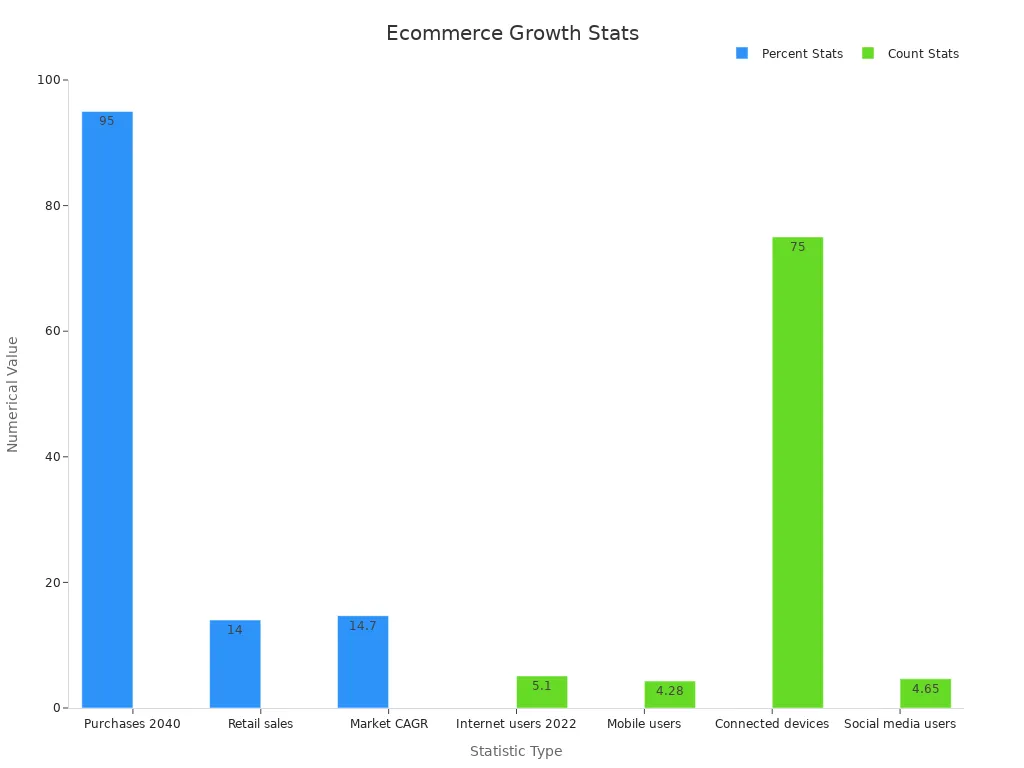
You see the demand for digital commerce jobs keeps growing. Sobot Voice/Call Center and Sobot AI help you connect with customers and improve your ecommerce career. Think about which ecommerce jobs match your skills and ambitions. The future of online commerce starts with you.
BrandShop Digital Commerce Careers
Why Work at BrandShop
You want to join a place where digital commerce is more than just a buzzword. BrandShop digital commerce leads the way in the online world. Every day, you see how fast commerce changes. At BrandShop, you get to work with the latest ecommerce tools and help shape the future of online shopping. The company puts customer contact and support at the center of everything. You will find a team that values your ideas and gives you real opportunities to grow your career.
BrandShop digital commerce offers you a chance to work on projects that matter. You can help build better online stores, improve customer experiences, and make commerce easier for everyone. The company supports your learning and gives you access to the best technology in the e-commerce business. If you want to work in a place that values innovation and teamwork, BrandShop is the right choice.
Tip: Many people who start their career at BrandShop digital commerce find new opportunities to move up fast. You can learn from experts and take on new challenges every day.
Sobot’s Role in E-Commerce

BrandShop trusts Sobot as a key technology partner. Sobot’s Voice/Call Center helps you manage customer calls and messages from one place. This makes your job in ecommerce smoother and more efficient. Sobot’s cloud-based solutions power over 70% of contact center upgrades in the e-commerce business. You will notice a 35% drop in customer waiting times thanks to AI-driven tools. Omnichannel support means you can help customers on chat, phone, or social media without switching systems.
Here’s a quick look at how Sobot boosts ecommerce performance:
| Metric Description | Value/Impact |
|---|---|
| Percentage of contact center business from system upgrades | Over 70% driven by cloud-based contact centers and AI assistance |
| Reduction in customer waiting times | 35% decrease due to AI-driven solutions |
| Improvement in channel integration | Omnichannel solutions reduce disjointed system issues, benefiting ecommerce clients |
You get to use these advanced tools every day. Sobot’s technology helps you deliver better service and makes your work in the e-commerce business more rewarding.
Ecommerce Manager
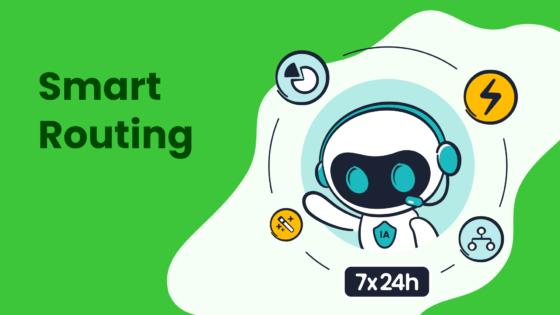
Role Overview
You play a huge part as an e-commerce manager at BrandShop. You lead the digital commerce strategy and make sure every online store runs smoothly. Your job is to boost sales, improve customer experiences, and keep up with new trends in commerce. Industry data shows that e-commerce managers use data analytics and AI to personalize shopping, which can increase sales by up to 20%. You also drive automation and help your team adopt new tools like voice commerce and augmented reality.
Sobot’s Voice/Call Center makes your job easier. You can manage customer calls, track orders, and solve problems all in one place. This tool helps you respond faster and keeps customers happy. You get to see real-time data and use smart routing to make sure every customer talks to the right person. That’s how you keep BrandShop ahead in the fast-changing world of digital commerce.
Tip: E-commerce managers who use advanced personalization see a 10-15% revenue lift and 10-30% higher marketing efficiency (McKinsey, 2023).
| Aspect | Evidence | Impact |
|---|---|---|
| Personalization | Retailers using advanced personalization see 10-15% revenue lift and 10-30% higher marketing efficiency | Shows e-commerce manager's impact on revenue |
| Omnichannel Retailing | Omnichannel customers spend 4% more in-store and 10% more online | E-commerce manager improves customer loyalty |
| Operational Efficiency | Digital transformation leads to 20-30% cost reduction | E-commerce manager optimizes operations |
| Emerging Trends | Social commerce projected to reach $1.2T by 2025 | E-commerce manager leads tech adoption |
Key Skills
To succeed as an e-commerce manager, you need a mix of technical and people skills. You must know how to use analytics tools, manage teams, and create great customer experiences. You also need to spot new trends and act fast. Many e-commerce managers work with marketing, IT, and customer service teams every day.
Recent studies show skill gaps in areas like advanced analytics, omni-channel strategy, and cross-cultural competence. You should focus on building these skills to stay ahead. Soft skills like communication and emotional intelligence matter too. If you want to lead in digital commerce, keep learning and adapting.
| Key Skills | Skill Gaps |
|---|---|
| Adaptability | Need for upskilling in tech innovation |
| Strategic Thinking | Gaps in omni-channel strategy |
| Leadership | Underdeveloped stress management |
| Analytics | Deficiency in data-driven decision-making |
| Customer Experience | Need for better optimization |
Career Path
The career path for an e-commerce manager looks bright. The number of e-commerce manager jobs keeps growing every year. In the United States, jobs in this field are expected to grow by 10% from 2018 to 2028. Remote work and digital tools make these jobs even more accessible. You can start as an assistant or analyst and move up to senior manager or director roles.
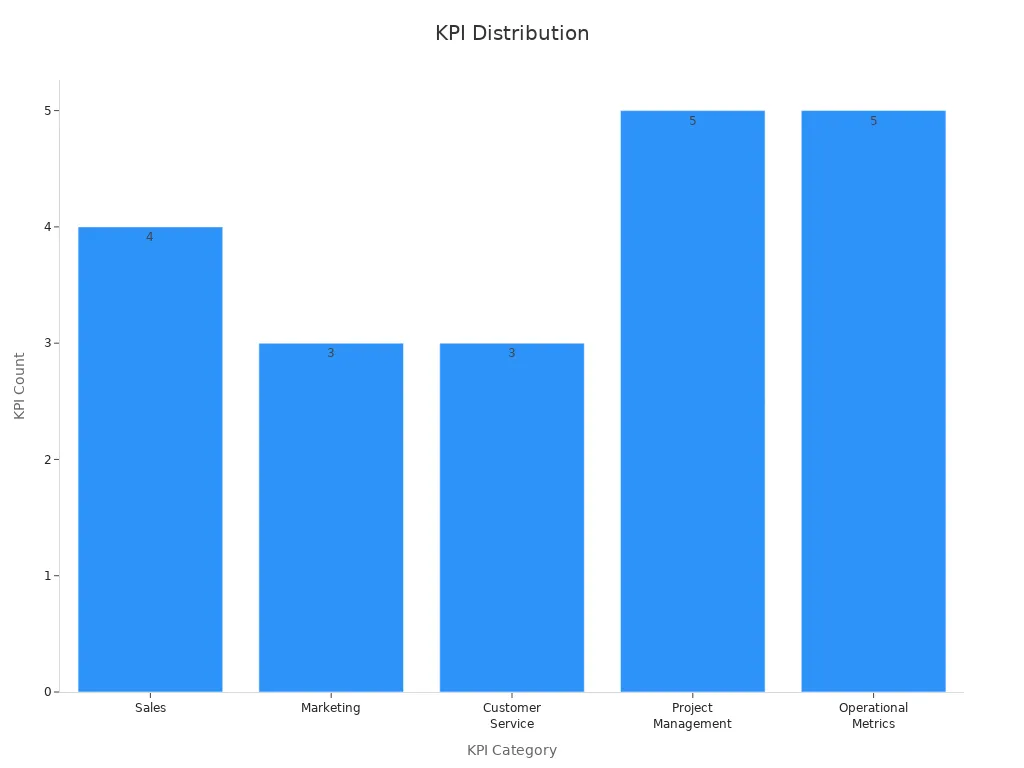
You will find more opportunities as commerce shifts online. Experts say you should keep learning new skills and stay flexible. If you love digital commerce and want to lead teams, this path offers steady growth and exciting challenges.
Digital Marketing Specialist
Responsibilities
You help BrandShop stand out in the busy world of online commerce. As a digital marketing manager or ecommerce marketing specialist, you plan and run campaigns that reach customers everywhere. You use SEO and SEM to make sure people find BrandShop when they search online. You create ads, manage budgets, and track how well each campaign works. You also use email marketing to send the right message to the right person at the right time. Social media is your playground. You build relationships, answer questions, and share stories that make people want to shop with BrandShop.
Here’s how top brands use marketing to win in commerce:
| Company | Challenge/Task | Strategy/Solution | Impact/Outcome |
|---|---|---|---|
| Under Armour | Stand out in sports apparel | Built fitness app ecosystem | Stronger loyalty |
| Disney | Enter streaming market | Used exclusive content and cross-promotion | Millions of new subscribers |
| Peet's Coffee | Boost online sales | Focused Google Ads on high-ROI keywords | 158% higher ROAS, 455% more revenue |
| Coca-Cola | Increase engagement | “Share a Coke” campaign with social media sharing | Improved sales and loyalty |
You use tools like Sobot’s Voice/Call Center to connect with customers and answer questions fast. This makes your marketing campaigns even more effective.
Required Skills
You need to know how to use marketing analytics tools like Google Analytics or Improvado. These help you see what works and what doesn’t in your campaigns. You should understand SEO, SEM, and paid advertising. You must write well and create content that people want to read or watch. Social media skills are a must. You also need to know how to use email marketing platforms like Mailchimp. If you want to become a digital marketing manager, you should learn how to lead a team and manage big projects.
Tip: A clear brand strategy helps you build trust and loyalty. You make BrandShop’s mission and values easy to understand. This is why companies need skilled ecommerce marketing specialists who can create strong, lasting brands.
Growth Opportunities
You have many opportunities to grow in digital commerce. Job postings for digital marketing specialists have jumped 22% each year since 2020. Entry-level jobs pay about $55,000, but experienced digital marketing managers can earn over $100,000 a year. Companies want people who know SEO, data analytics, and social media. If you keep learning and get certified, you can move up fast.
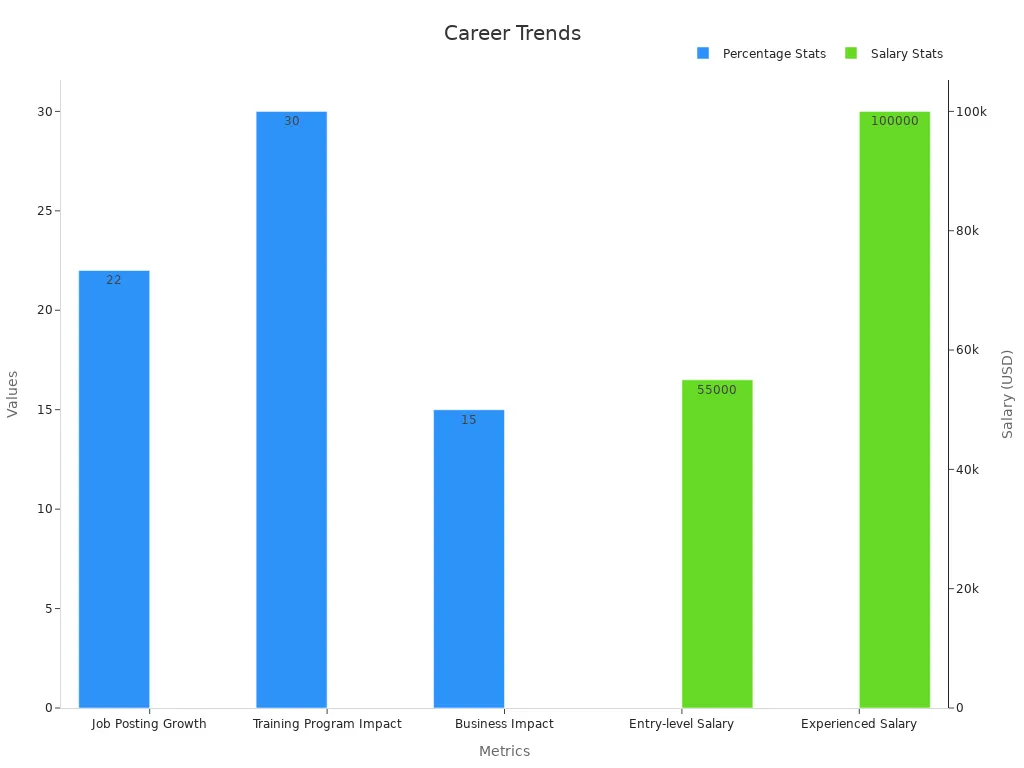
- The ecommerce marketing specialist role gives you experience in many areas of marketing.
- You can get promoted, earn more, and even lead your own team.
- AI and data analytics skills will help you stand out in the next few years.
- Building your network and learning new tools will open more doors in online commerce.
If you want a job where you can grow, learn, and make a real impact, digital marketing at BrandShop is a smart choice.
Customer Experience Lead
Job Scope
You help shape every part of the commerce journey at BrandShop. As a Customer Experience Lead, you make sure customers feel valued from the first click to the last step of their purchase. You look at how people use the online store, listen to their feedback, and find ways to make shopping easier. Your job is to connect the dots between what customers want and what the business needs. You use tools like Sobot’s Voice/Call Center to track calls, answer questions, and solve problems fast. This helps you build trust and keep customers coming back. Studies show that when you manage customer experience well, you boost satisfaction, trust, and repeat purchases. You also help your team work better together, making commerce smoother for everyone.
- You focus on connectedness, customization, and ease of use in commerce.
- You use data to see what works and what needs fixing.
- You help turn happy shoppers into loyal fans.
Essential Skills
You need a mix of technical and people skills to lead in commerce. Here’s a quick look at what matters most:
| Essential Skill | Description & Impact |
|---|---|
| Product Knowledge | Know the products inside and out to answer questions and fix issues. |
| Technical Expertise | Use CRM, ticketing, chat, and voice systems like Sobot to help customers quickly. |
| Artificial Intelligence | Use AI to make workflows faster and improve customer experience. |
| Omnichannel Awareness | Manage chats, calls, and social media for a seamless commerce journey. |
| Communication | Listen well and explain things clearly to build trust. |
| Problem-solving | Find solutions fast to keep commerce moving. |
| Empathy | Understand how customers feel and help them in tough moments. |
You also need to measure what works. A data-driven mindset helps you spot strengths and weaknesses in commerce. Leadership and adaptability help you guide your team through changes in the market.
Advancement
You have many opportunities to grow in commerce as a Customer Experience Lead. Most people start as a CX analyst or manager, then move up to director or even Chief Customer Officer. In fact, 70% of CX Leads get promoted to Director or higher within five years. Companies with strong CX leaders see a 20% jump in customer satisfaction and a 15% boost in retention. If you keep learning and earn new certifications, you can move up faster. Some people even switch to marketing or global roles. The demand for CX leaders in commerce is expected to grow by 18% in the next five years (source). You can find a path that fits your goals and make a real impact on the future of commerce.
Tip: Keep building your skills and stay curious. The more you learn about commerce and customer experience, the more doors will open for you.
CRM Analyst
Main Duties
As a CRM analyst, you help BrandShop understand what customers want and how they behave in commerce. You collect and study data from every part of the e-commerce journey. You work closely with the e-commerce developer and e-commerce analyst teams to spot trends, track sales, and find ways to improve customer relationships. Your job is to make sure every customer feels valued and comes back for more. You use CRM tools to build reports, automate tasks, and help the developer team create better solutions for commerce. You also help the e-commerce developer and e-commerce analyst teams use data to make smart decisions.
Here’s a look at how CRM impacts commerce:
| Metric / Statistic | Value | Impact / Insight |
|---|---|---|
| Improved access to customer data | 74% | Better understanding of customer needs |
| Cloud-based CRM adoption | 87% | Flexible, scalable solutions for commerce |
| CRM users on multiple devices | 81% | Easy access for e-commerce developer teams |
| Sales increase after CRM | 29% | Direct boost to commerce revenue |
| Productivity boost from CRM | 34% | More efficient e-commerce analyst teams |
You see how important your work is for commerce and for every e-commerce developer and e-commerce analyst at BrandShop.
Technical Skills
You need strong technical skills to succeed as a CRM analyst in commerce. You work with data every day, so you must know how to use SQL, Excel, and tools like Tableau or Power BI. You also need to understand CRM platforms such as Salesforce or Sobot, which help you manage customer data and automate tasks. As an e-commerce developer or e-commerce analyst, you often use process modeling tools like Visio and know how to run workshops or interviews to gather requirements. You also need to write clear reports and work with the developer team to improve commerce systems.
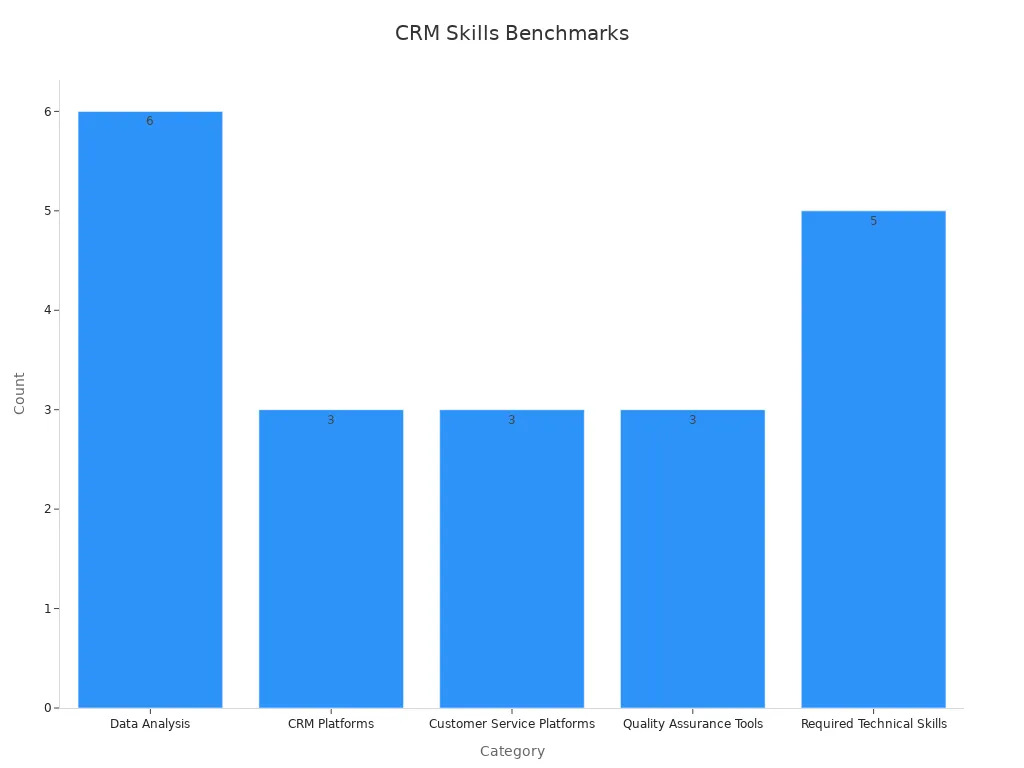
Tip: Sobot’s CRM integration lets you access customer data, automate workflows, and boost productivity for every e-commerce developer and e-commerce analyst. This makes commerce smoother and more efficient.
Career Growth
You have a bright future as a CRM analyst in commerce. The demand for e-commerce developer and e-commerce analyst roles keeps rising. Data-related jobs like CRM analyst, data scientist, and e-commerce analyst are growing much faster than average. The US Bureau of Labor Statistics says data scientist jobs will grow by 36% and market research analyst roles by 19% from 2021 to 2031 (source). Salaries for e-commerce analyst and developer roles are also climbing. You can move up to senior analyst, CRM manager, or even lead a team of e-commerce developers. Many companies want experts who know how to use AI and cloud-based CRM tools like Sobot. If you keep learning and get certified, you will find many chances to grow in commerce.
- Salesforce CRM careers are growing in commerce, especially for e-commerce developer and e-commerce analyst roles.
- Cloud-based solutions and AI make your skills even more valuable.
- Certifications help you stand out as a top e-commerce developer or e-commerce analyst.
E-Commerce Customer Support Specialist
Daily Tasks
You play a key role in keeping customers happy in e-commerce. Every day, you answer questions about orders, returns, and products. You handle chats, emails, phone calls, and even social media messages. You use scripts and templates to reply quickly and clearly. You also track first response times because fast answers mean fewer repeat contacts and less ticket volume. Many e-commerce specialist jobs use customer service software to bring all messages into one place. This helps you stay organized and work faster.
Here are some real examples of what you might do:
| Company | Automation Rate | Response Time Reduction | Key Daily Tasks |
|---|---|---|---|
| Glossier | N/A | 87% reduction | Answering inquiries, resolving tickets |
| Clove | 70% | 3 min first response | Order updates, exchanges, billing |
| EvryJewels | 89% | 87.5% reduction | Returns, refunds, ticket automation |
| Petlibro | 79% | 30% faster resolutions | 24/7 support, social media management |
You also help with delivery quality. You make sure orders are correct, arrive on time, and are packed safely. This is a big part of keeping customers satisfied in commerce.
Sobot Voice/Call Center Integration
Sobot’s Voice/Call Center makes your e-commerce specialist job much easier. You get all customer calls, chats, and messages in one workspace. You can see customer info right away and use AI to help answer questions. Sobot helps you solve problems in less than a minute. You can track calls, record conversations, and use smart routing to send each customer to the right agent.
Check out these results from Sobot integration:
| Performance Metric | Improvement/Value | Description/Impact |
|---|---|---|
| Net Promoter Score (NPS) | +35% | Higher customer loyalty and satisfaction |
| Agent Workload Reduction | 60% | AI Copilot boosts agent efficiency |
| Conversion Rate Increase | 15% | Better engagement and sales |
| Resolution Time | <1 minute | Fast issue resolution with AI and human agents |
| Customer Satisfaction (CSAT) | 93% (OPPO case) | High satisfaction in conversational support |
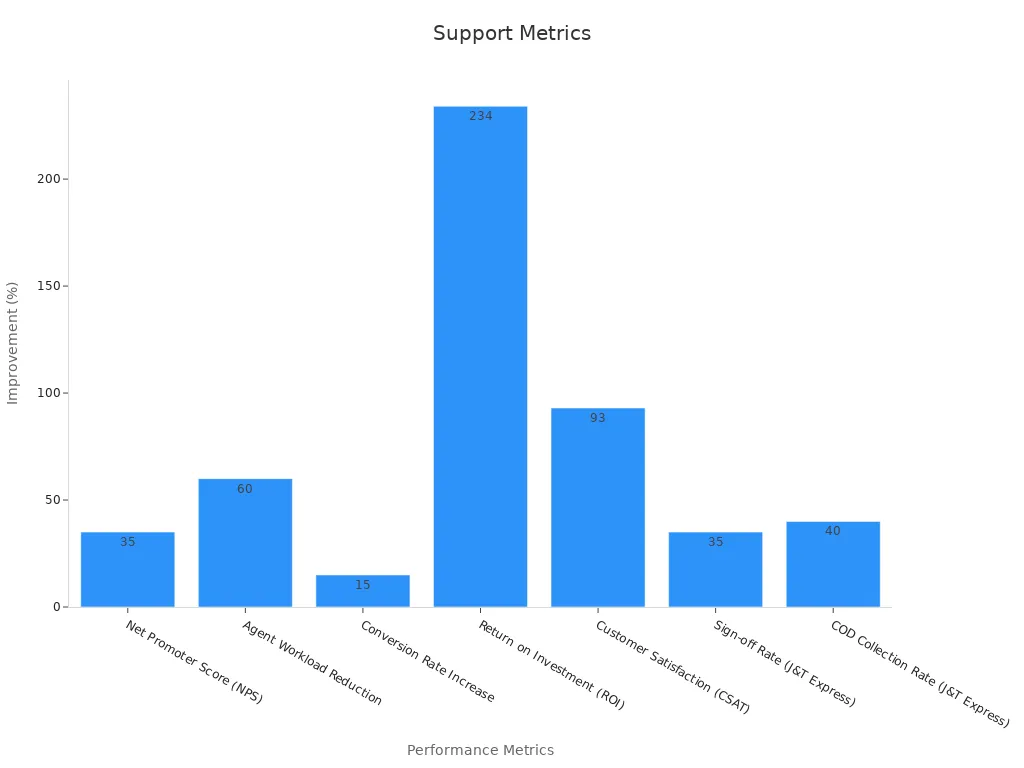
You can see how Sobot helps you deliver top service in e-commerce. You save time, reduce stress, and make customers happier.
Skills Needed
To succeed as an e-commerce specialist, you need both hard and soft skills. You should know how to use CRM systems, manage orders, and handle inventory. You need strong communication and problem-solving skills. You must stay calm under pressure and work well with your team. As you grow, you might lead projects or train new team members.
Here’s what you need at each level:
- Entry-level: Learn data entry, inventory, and basic reporting.
- Mid-level: Build project management and process improvement skills.
- Senior: Lead teams, plan strategy, and manage budgets.
You also need to listen well and adapt to changes in commerce. Many e-commerce specialist jobs want people who keep learning and get certified in customer experience or project management.
Tip: Great customer support in e-commerce can boost profits by 25% with just a 5% increase in customer retention. Happy customers come back and tell their friends!
Digital Merchandising Manager
Role Focus
As a digital merchandising manager at BrandShop, you shape how products appear and sell in online commerce. You decide which items get featured, how they look, and what stories they tell. Your main goal is to boost sales and make shopping easy for everyone. You use data to see what works and change things fast. Many brands now use retail media networks, like Costco, to collect customer data and test new ideas. Grocery retailers see retail media as a way to stay relevant in both physical and digital commerce. You help BrandShop stand out by using smart tools and creative displays.
- Grocery retailers use first-party data to drive profits and keep brands visible.
- Costco’s retail media network shows how data-driven merchandising helps brands target the right audience.
- The shift to digital marketing means more demand for digital merchandising managers.
- Solution selling, like H-E-B’s recipe integration, shows how you can boost engagement and sales in commerce.
You can use Sobot’s analytics to track what customers like and adjust your digital shelf in real time.
Key Competencies
To succeed as a digital merchandising manager in commerce, you need a mix of skills. Here’s a quick look at what matters most:
| Competency Category | Example Competencies | Proficiency Levels & Behavioral Indicators |
|---|---|---|
| Industry Competencies | Retail Industry Knowledge, Retail Pricing | From basic understanding to mastery, including pricing strategies and predictive analytics. |
| Job Family Competencies | E-commerce Site Management, A/B Testing | Skills in SEO, site design, testing, and data interpretation, from beginner to expert. |
| Core Competencies | Business Acumen, Scheduling, KPIs | Planning, business insight, and performance measurement at all levels. |
Competency models help you know what to learn next. They guide your growth and make sure you meet the needs of modern commerce. Sobot’s unified workspace lets you see inventory, social media, and analytics in one place, making your job easier and more efficient.
Career Steps
You can build a strong career as a digital merchandising manager in commerce. Here’s how you can move up:
- Develop skills in analytics, leadership, and communication.
- Get hands-on experience as an assistant merchandiser or sales associate.
- Grow your network by connecting with other managers and joining industry events.
- Build a portfolio with your best merchandising projects.
- Keep learning about commerce trends and earn certifications.
- Explore different paths, like retail management or supply chain roles.
- Consider a degree in business, marketing, or retail management.
Tip: Brands with strong digital merchandising see higher conversion rates, bigger orders, and loyal customers. Research shows 88% of shoppers value the experience as much as the product (Salesforce Research).
UX/UI Designer for E-Commerce
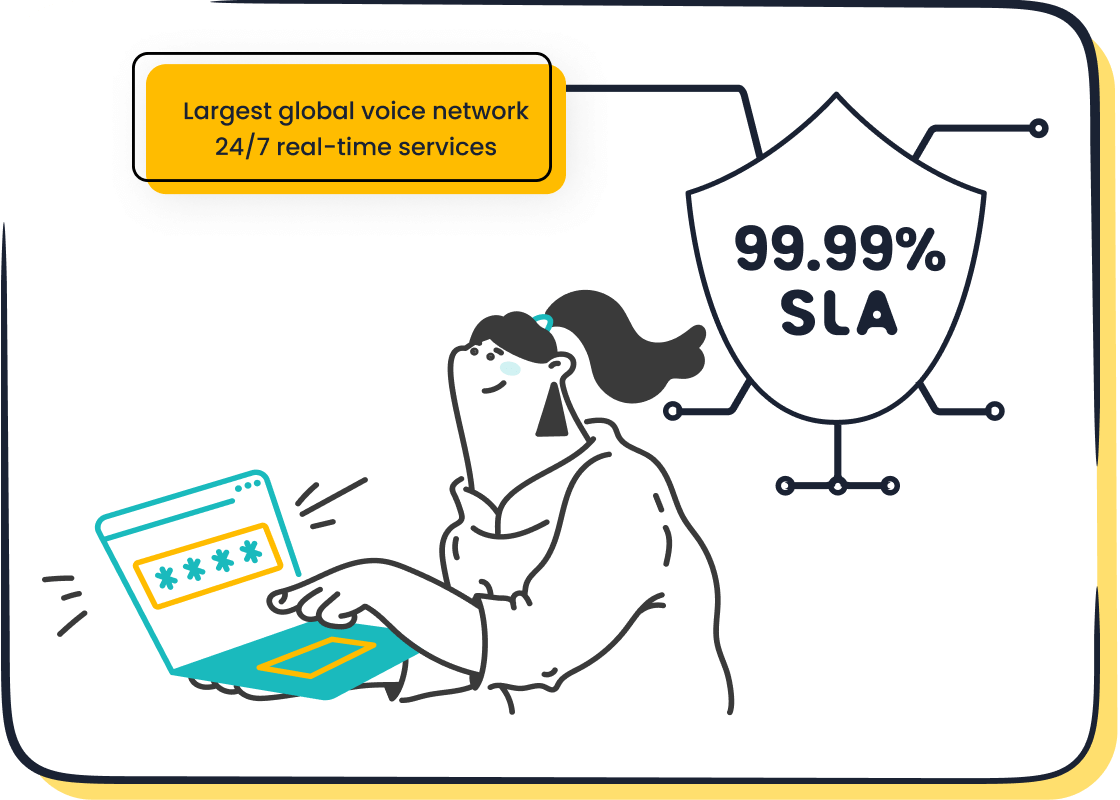
Design Focus
As an e-commerce designer, you shape how people feel when they shop online. You make sure every part of the commerce journey is smooth, clear, and fun. Your work helps customers find what they want fast and enjoy the process. A great e-commerce designer pays attention to details like button size, color, and layout. You also think about how your designs look on phones, tablets, and computers.
Did you know that a well-designed interface can boost e-commerce conversion rates by up to 400%? That’s huge for any commerce business. Companies like HubSpot saw a 33% jump in revenue after fixing usability issues. Even small changes, like renaming a button, can bring in millions more in sales. Employers want e-commerce designers who know about mobile-first design, accessibility, and even new tech like AR/VR. You help brands stand out in a crowded commerce market.
| Metric / Trend | Description |
|---|---|
| Conversion Rate | Up to 400% increase with strong UX/UI |
| Job Growth | 22% annual growth in UI/UX roles |
| Competition | 50-100 applicants per job posting |
Tip: Always test your designs with real users. Their feedback can help you spot problems and make your e-commerce site even better.
Technical Abilities
You need strong technical skills to succeed as an e-commerce designer. You use tools like Figma, Sketch, or Adobe XD to create wireframes and prototypes. You also work with data to see how users interact with your designs. Metrics like conversion rate, bounce rate, and session duration show what’s working in commerce and what needs fixing.
E-commerce designers often run A/B tests to compare different layouts. You might use analytics to see which design keeps shoppers on the site longer or helps them finish a purchase. Companies expect you to show how your work improves business results. For example, Amazon raised conversion rates by 29% after fixing user journey issues. Spotify and Netflix use data to personalize experiences, which keeps users coming back. Sobot’s unified workspace lets you see customer feedback and behavior in one place, making it easier to improve your designs for commerce.
| KPI | Why It Matters for E-Commerce Designers |
|---|---|
| Conversion Rate | Shows if your design helps users buy |
| Bounce Rate | Tells if users leave too soon |
| Session Duration | Measures engagement with your commerce site |
| Error Rate | Helps you spot and fix usability problems |
Career Progression
You have many ways to grow as an e-commerce designer, but the path is not always clear. Most UX teams don’t have set career ladders, so you often drive your own growth. You might start as a junior e-commerce designer, then move up to senior, lead, or even manager. Some designers choose to stay as experts, while others go into leadership.
The demand for e-commerce designers keeps rising. The World Economic Forum says there will be 92 million new digital jobs by 2030, and design skills are a top priority. Sectors like finance and healthcare need more e-commerce designers to improve digital commerce experiences. AI tools now help you work faster, so you can focus on creative and strategic tasks. If you keep learning new skills and stay curious, you’ll find lots of opportunities in commerce.
- UX research jobs grew by 53% in five years.
- Many e-commerce designers feel career growth is slow, but skill-building and recognition help.
- New industries like fintech and medtech want e-commerce designers for better commerce solutions.
Note: Building a strong portfolio and learning from real projects will help you stand out in the busy e-commerce job market.
Data Analyst for Ecommerce
Data Responsibilities
You help BrandShop make smart decisions in commerce by turning numbers into stories. Every day, you collect data from many places—websites, sales platforms, CRM systems, and marketing tools. You organize and clean this data so it’s ready for analysis. You track key metrics like conversion rates, revenue, average order value, and customer acquisition cost. You use dashboards and charts to show what’s happening in commerce right now. Your reports help teams spot trends, fix problems, and plan for the future. You also work with other teams to make sure everyone understands the data. Tools like Tableau, Power BI, and Python help you create visuals that make complex commerce data easy to understand. You even use real-time data to help BrandShop react quickly to changes in commerce.
- You analyze customer behavior to improve marketing and boost satisfaction.
- You track sales and inventory to keep commerce running smoothly.
- You help spot fraud and protect both the business and customers.
- You use predictive analytics to forecast demand and plan for busy times.
Tip: Sobot’s analytics features let you see customer interactions across all channels, making your commerce data even more powerful.
Analytical Skills
You need strong analytical skills to succeed in commerce as a data analyst. You handle huge amounts of data every day. You clean, sort, and check this data for errors. You use statistics to find patterns and test ideas. Tools like Python, R, and SQL help you automate tasks and dig deeper into commerce data. You design experiments and run A/B tests to see what works best. You also need to explain your findings in simple words so everyone can use them. Good communication helps you share insights with your team and make better decisions in commerce. You stay curious and keep learning about new tools, like AI and real-time analytics, to stay ahead in the fast-changing world of commerce.
- You use data visualization to turn numbers into clear stories.
- You automate boring tasks so you can focus on big questions in commerce.
- You learn about new trends, like AI, to keep your skills sharp.
Growth Path
The future looks bright if you want to grow as a data analyst in commerce. The global data analytics market is booming. In 2023, it reached $7.03 billion, and experts expect it to hit $303.4 billion by 2030. Jobs for data analysts are growing fast—35% growth is expected from 2022 to 2032. You can start with an entry-level salary of $61,000 and move up to over $100,000 as you gain experience. Senior analysts in commerce often lead teams or become data science managers. Companies need more experts who can turn commerce data into action. As commerce grows, your skills will be in high demand.
| Metric | Data |
|---|---|
| Global Data Analytics Market Size (2023) | $7.03 billion |
| Projected Market Size (2030) | $303.4 billion |
| Projected Job Growth (2022-2032) | 35% |
| Median Salary | $82,000 |
| Senior-Level Salary | $89,000+ |
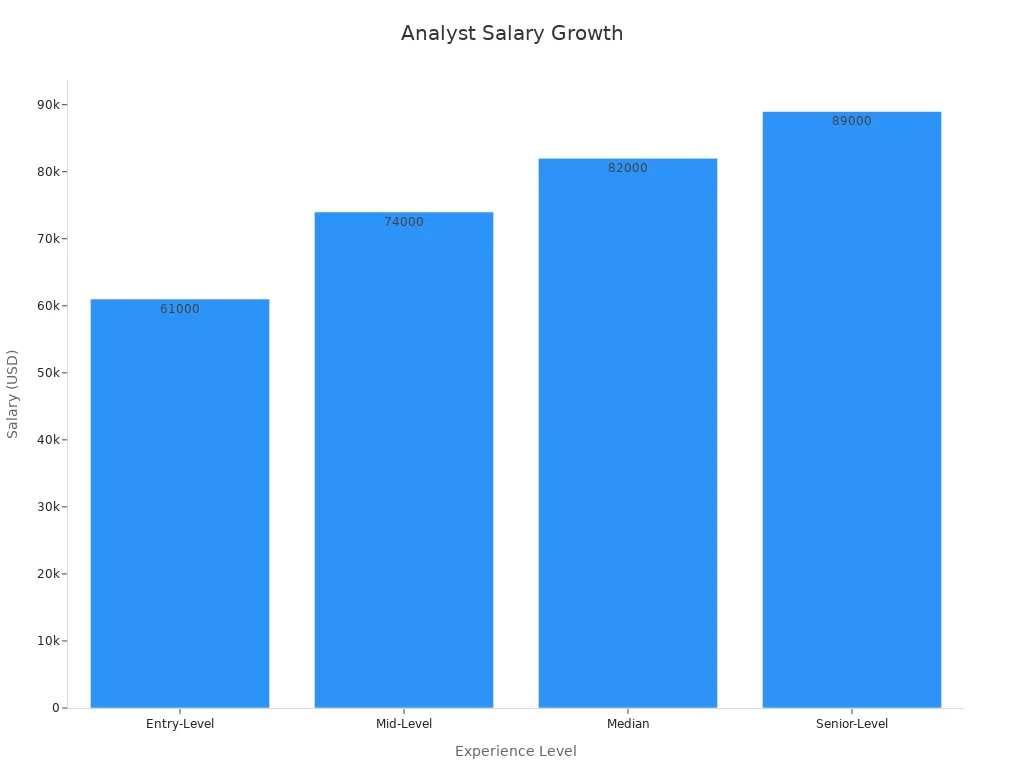
Note: As commerce keeps changing, your ability to analyze and explain data will help BrandShop stay ahead.
Omnichannel Operations Coordinator
Job Overview
You make sure every customer has a smooth experience across all channels in commerce. As an Omnichannel Operations Coordinator, you connect e-commerce platforms, physical stores, and social media into one seamless journey. You work with the developer team to link different platforms, so customers can shop, ask questions, and get help anywhere. Your job is to track orders, check inventory, and solve problems fast. You use data to see what works and fix what doesn’t. Many top brands, like Amazon and Walmart, use this role to keep commerce running smoothly. You focus on order fulfillment, shipping accuracy, and customer satisfaction. Here’s a quick look at the key metrics you watch:
| Performance Metrics | Description |
|---|---|
| Order Fulfilment Rate | How many orders you deliver on time and in full |
| Inventory Accuracy | How well you track products across all e-commerce platforms |
| Shipping Accuracy | Making sure every order goes to the right place |
| Customer Satisfaction | How happy customers feel with their commerce experience |
| Supply Chain Efficiency | How quickly you move products through all platforms |
| Transportation Costs | How much you spend to ship products across commerce channels |
You help the developer team keep all e-commerce platforms connected and running well.
Sobot Integration
Sobot makes your job much easier. You use Sobot’s omnichannel solutions to bring together chat, email, voice, and social media on one platform. Sobot’s AI voicebot can handle over half of customer calls by itself, so you and the developer team can focus on bigger problems. The AI chatbot collects info, predicts what customers need, and helps you answer questions faster. Sobot supports e-commerce platforms and connects all your commerce channels. You get real-time data and smart tools to manage orders, track inventory, and improve customer satisfaction. Sobot’s platform uses advanced AI models to make every interaction feel personal and professional. You also know that Sobot keeps your data safe and follows global privacy rules. Many companies say Sobot’s voicebot feels almost human and solves problems quickly. This helps you deliver a better commerce experience on all platforms.
- Sobot’s AI agents boost sales by over 30% with automated outbound marketing.
- The platform supports the whole commerce journey, from pre-sales to post-sales support.
- You can see all customer interactions from every channel in one place.
Required Skills
You need a mix of technical and people skills to succeed in this role. You work with the developer team to connect e-commerce platforms and keep commerce running smoothly. Here are the main skills you need:
| Skill Category | Why It Matters for Omnichannel Operations Coordinators |
|---|---|
| Omnichannel Retail Experience | You know how to create seamless journeys across all platforms |
| Leadership and Management | You plan, train, and guide teams in commerce |
| Customer Relations | You solve problems and design great experiences |
| Emerging Technologies | You learn about new tools like AI and AR for e-commerce platforms |
| Project Management | You lead projects and work with the developer team |
| Data Analysis and KPI Tracking | You use data to improve commerce and track success |
| Compliance and Ethics | You follow rules and keep customer data safe |
You also use AI and analytics to check call center data, measure agent productivity, and improve customer service across all platforms. You must adapt quickly, work well with others, and always look for ways to make commerce better. Companies want you to know how to use e-commerce platforms, manage projects, and work with the developer team to keep everything running smoothly.
Tip: The best Omnichannel Operations Coordinators use data and AI to spot problems early and keep commerce moving forward on all platforms.
Digital Commerce Product Manager
Product Focus
As a digital commerce product manager, you focus on building products that customers love. You use data to see what works and what needs fixing. You track important numbers like conversion rate, average order value, and return rate. These numbers help you spot problems and find ways to grow sales. For example, ASOS boosted its conversion rate by 20% after adding reviews and size guides. You also watch customer reviews and use tools like SurveyMonkey or Typeform to collect feedback. This helps you understand what shoppers want and how to improve your product pages.
| Metric / Study | Description / Role in Product Focus | Example / Application |
|---|---|---|
| Conversion Rate | Measures how many visitors buy something. | ASOS improved conversion by 20% after adding reviews and size guides. |
| Average Order Value | Shows how much customers spend each time they shop. | - |
| Return Rate | Tells you if customers are happy with their purchases. | Used with reviews to fix product problems. |
| Customer Review Monitoring | Helps you see what people like or dislike about your products. | Samsung uses AI to adjust features and marketing strategies. |
| Inventory Availability | Makes sure products are always in stock. | Amazon uses predictive analytics to reduce stockouts. |
You use analytics tools like Google Analytics and Tableau to track these metrics. Sobot’s unified workspace can help you see customer feedback and product data in one place, making your job easier.
Leadership Skills
You need strong leadership skills to succeed as a digital commerce product manager. You guide teams and make big decisions every day. You work with marketing, sales, and development to launch new products. You use a strategic mindset to spot trends and plan for the future. You also need to understand data and use it to make smart choices. Good communication helps you explain your ideas and get everyone on board.
- You put the customer first by gathering feedback and watching user behavior.
- You use agile methods to adapt quickly to changes in the market.
- You focus on key metrics like conversion rates and customer lifetime value.
- You keep learning about new technology and trends.
- You work closely with marketing and sales teams to make sure products succeed.
Sobot’s collaboration tools, like its omnichannel platform, help you connect with your team and keep everyone updated.
Career Ladder
You can grow fast as a digital commerce product manager. Most people start as an associate product manager, learning the basics and working on small projects. Next, you become a product manager, taking charge of features or products. As you gain experience, you move up to senior manager, then director of product, and finally chief product officer.
- Associate Product Manager: Learn the basics and help with small tasks.
- Product Manager: Own features or products and work with different teams.
- Senior Product Manager: Solve bigger problems and mentor others.
- Director of Product: Lead multiple teams and set product goals.
- Chief Product Officer: Guide the company’s product strategy at the top level.
You build your skills in data analysis, project management, and marketing as you move up. Training, certifications, and a strong portfolio help you climb the ladder. Many managers also network with others in the industry to find new opportunities.
Tip: Keep learning and stay curious. The best product managers always look for new ways to improve products and help their teams grow.
Skills for Ecommerce Success
Technical Skills
You need strong technical skills to succeed in ecommerce. These skills help you manage online stores, use data, and run digital marketing campaigns. Many employers look for people who know how to use analytics tools like Google Analytics or HubSpot. You should also know how to work with ecommerce platforms, manage product listings, and use customer service software. Sobot’s unified workspace, for example, lets you handle calls, chats, and customer data all in one place, making your job easier.
Many professionals earn certifications to show their skills. Here’s a quick look at some popular options:
| Certification Name | Best For | Description Summary |
|---|---|---|
| Google Analytics Individual Qualification (IQ) | Data Analysts, SEO Specialists | Shows you can collect and report data for ecommerce sites. |
| OMCP Certified Professional in Digital Marketing | Digital Marketing Managers | Proves skills in SEO, PPC, and web analytics. |
| Shopify Ecommerce Design Expert | Web Designers, UX/UI Designers | Focuses on Shopify store design and customization. |
| Adobe Certified Expert (ACE) in Magento Commerce | E-commerce Developers | Validates Magento platform management skills. |
Tip: Earning a certification can help you stand out in the ecommerce job market.
Soft Skills
Soft skills matter just as much as technical know-how in ecommerce. You need to talk with customers, solve problems, and work well with your team. Employers want people who can think fast, adapt to change, and show responsibility. Negotiation and persuasion help you get better deals with suppliers and turn visitors into buyers. You also need to multitask and stay calm when things get busy.
- Communication helps you explain things clearly to customers.
- Flexibility lets you handle new tools or sudden changes in marketing.
- Leadership inspires your team and builds trust.
Good soft skills help you build strong relationships and keep customers coming back.
Industry Knowledge
You need to know how ecommerce works to succeed. This means understanding how online stores use data, track sales, and improve customer experience. You should learn about website analytics, customer behavior, and digital marketing trends. Tools like Sobot’s analytics dashboard help you see what customers want and how they shop. Big data lets you spot trends, personalize offers, and fix problems fast.
Here are some key areas to focus on:
- Website metrics like bounce rate and page views show how your ecommerce site performs.
- Personalization and behavioral targeting help you send the right marketing message at the right time.
- End-to-end analytics let you track inventory, shipping, and sales for better decisions.
Staying updated on industry trends and tools will help you grow your ecommerce career.
How to Start Your BrandShop Career
Application Tips
You want to land one of the best jobs in ecommerce at BrandShop. Start by picking the job positions that match your skills and interests. Many people begin with entry-level jobs in ecommerce, which help you learn fast and grow quickly. Before you apply, check out the BrandShop careers page and read the job descriptions carefully. Make sure your resume highlights your experience with ecommerce tools, customer service, or digital marketing.
Show that you understand the ecommerce world. Research the latest trends, like print-on-demand or dropshipping, which let businesses start with low costs and scale up. The custom clothing market alone could reach $78.9 billion by 2027 (source). If you know how to use platforms like Sobot for customer contact, mention it. Sobot’s unified workspace and AI-powered tools help ecommerce teams work smarter and serve customers better.
Tip: Always tailor your application to each ecommerce job. Use keywords from the job posting and show how your skills fit the role.
Standing Out
You want to stand out from other people applying for jobs in ecommerce. Focus on what makes you unique. Find a niche, like sustainable products or size-inclusive fashion, and show your passion for it. Employers love when you understand the target audience and can bring new ideas to the table.
List any experience you have with entry-level jobs in ecommerce, even if it’s a small online store or a school project. Show that you can adapt quickly and learn from feedback. Many successful ecommerce careers start with people who try new things and keep up with trends. Use social media, email marketing, or influencer partnerships to show your marketing skills. If you have used Sobot or similar tools, share how they helped you improve customer satisfaction or solve problems fast.
- Research shows that flexible business models and rapid product changes help ecommerce businesses grow.
- Word-of-mouth and customer engagement can boost brand visibility.
- Online ecommerce jobs offer global reach and easier management than traditional retail.
Note: Stay flexible and keep learning. The ecommerce market changes fast, so being nimble helps you succeed in any job positions you choose.
You can build a great future in ecommerce at BrandShop. The market keeps growing, and more people want to buy directly from brands. Check out these numbers:
| Statistic Description | Value/Percentage |
|---|---|
| Consumers preferring to buy directly from manufacturers | 88% |
| Consumers preferring to buy directly from brands over retailers | 55% |
| Consumers expecting over 40% of spending on DTC brands in 5 years | 40% |
| DTC brands increasing marketing budgets | 78% |
| Traditional retailers increasing marketing budgets | 60% |
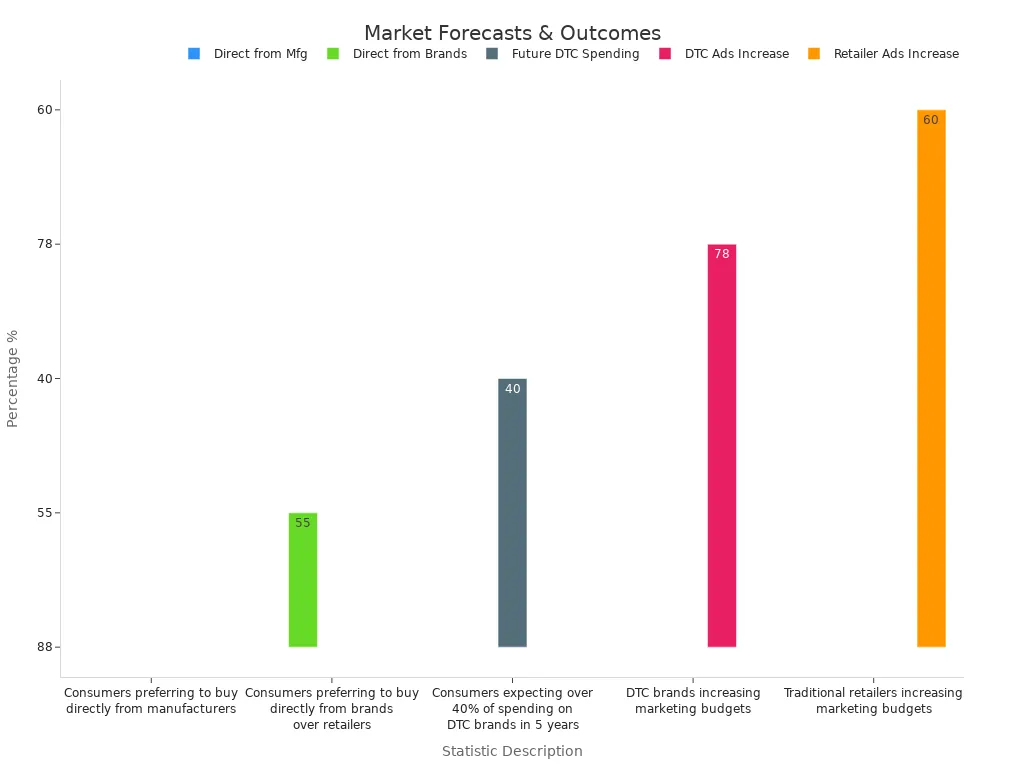
You can match your skills to the best ecommerce jobs and start your journey today. Sobot’s tools help you work smarter and deliver better customer experiences. Visit BrandShop’s careers page or learn more about Sobot’s ecommerce solutions. You will join a team that values innovation and puts customers first.
FAQ
What skills do you need for a job in e-commerce?
You need digital skills, like using online tools and understanding data. Communication and problem-solving help a lot. Many e-commerce jobs also want you to know customer service software, such as Sobot’s Voice/Call Center, which makes helping customers much easier.
How does Sobot help e-commerce teams?
Sobot gives you one workspace for calls, chats, and messages. You can see all customer info in real time. Sobot’s AI tools help answer questions fast. Many e-commerce brands use Sobot to boost customer satisfaction and save time every day.
Can you work remotely in e-commerce?
Yes, many e-commerce jobs let you work from home. You can manage online stores, answer customer questions, or run digital marketing campaigns from anywhere. Tools like Sobot’s cloud platform make remote work simple and secure for e-commerce teams.
What is the future of e-commerce careers?
E-commerce keeps growing fast. Experts say 95% of purchases will happen online by 2040 (Nasdaq). More companies need people who know e-commerce, digital marketing, and customer support. Learning new tools, like Sobot, helps you stay ahead.
See Also
Best 10 Live Chat Solutions Comparing Shopify And Rivals
Utilizing Live Chat On Shopify Within Retail Sector
Guide To Implementing Shopify Live Chat For Retail
